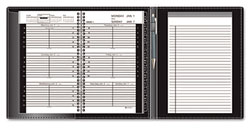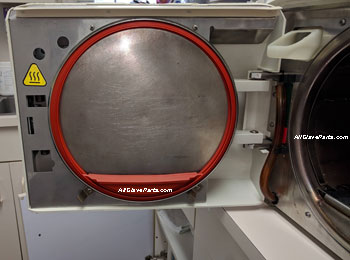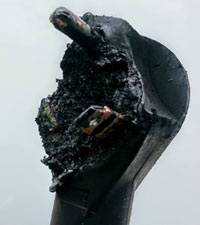The Case Of The Melting Autoclave
Dr B arrived at his surgical office this morning, and began his normal routine: turning on the lights in the office, his operatory, and checking his emails.
He then went into the break area and put on his favorite coffee
While it was brewing, he reviewed his appointment book to see what procedures he had scheduled for the day
Busy Schedule

After pouring his first cup of coffee, he walked down the hall and entered the room where his surgical instruments and autoclave are kept. Gathering the instruments he knew he needed for the day; he packaged them into their pouches, loaded them into his Midmark M11 autoclave, and started a cycle
Checking the clock, he saw it was close to time for his staff to arrive, so he unlocked the front door. After checking his email again, he went back to the room where his autoclave was running. As soon as he entered the room, he noticed a burning smell
Frightened that it was catching on fire, he went to unplug the unit from the wall outlet and saw where the plug had began to melt. This really scared him
Pulling on the cord, he managed to get it unplugged. Luckily, the autoclave had not begun to pressurize yet, so he could open the door. Dr B looked to see if anything had caught on fire
Everything Looked Okay

Dr B then removed the right-hand side panel (where the PC Board is located) to see if he could see any melted, loose, or burned wires anywhere. Again, everything looked normal. There were no visible indications of anything shorting out anywhere
Frustrated with not knowing what to do next, he remembered we had helped him before and decided to give us a call
After walking him thru the normal steps for locating a short, I asked him if the autoclave was plugged into a dedicated circuit
He said it was plugged into an outlet all by itself….but the autoclave was in a room with a cryogenic unit (basically a refrigerator)
As it turns out, we soon discovered all of the outlets in the room were actually on the same circuit
Here's What Happened

When the cryogenic unit came on while the autoclave was running, it caused a voltage drop to the autoclave. When this happens, the amperage (electrical current) increases, causing it to get super hot, super quick, and in this case…. melted the plug
Better Melting The Plug Instead of The Whole Autoclave

Dr B was lucky. If the plug had not gone out first, the amperage surge could have burned up the electronics in both machines; a very expensive outcome
The Moral of This Real Story
If you don't want a melting autoclave, keep it on a dedicated circuit (so nothing else can be plugged in to it) as recommended by all manufacturers
If you are not sure, or don't know how to check to see if it is on a dedicated circuit, have a licensed electrician do it for you
Installing a dedicated circuit is well worth the money and can save you thousands of dollars in the long run